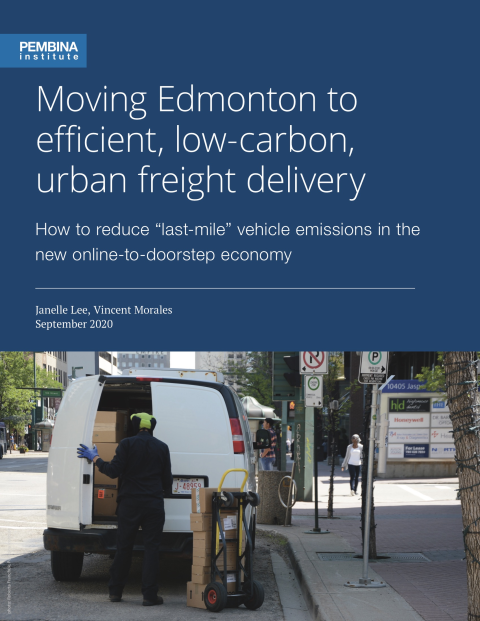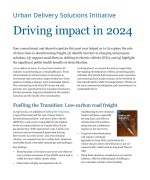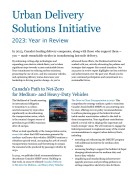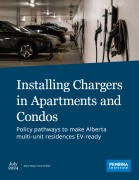The City of Edmonton is looking for ways to increase efficiency, and reduce emissions, in the growing number of short-haul or “last-mile” freight-delivery trips required to serve the new online economy.
The purpose of this report is to describe Edmonton’s urban freight situation and identify ways that the City can achieve its long-term strategic goods-movement and climate change objectives by decarbonizing urban freight activity. Stakeholder interviews and a jurisdictional scan of best practices were conducted to understand key urban freight issues in Edmonton and to identify approaches taken by other jurisdictions to manage and decarbonize the goods-movement sector.
Summary
Edmonton has demonstrated its leadership in tackling the climate crisis and its determination to stay within its carbon budget of 135 megatonnes of CO2e, currently equivalent to a net-zero emissions target, by 2050. In advance of preparing an updated climate strategy to align with the global target of limiting the Earth’s temperature increase to 1.5º Celsius, as per the Paris Agreement, the City commissioned this report to identify opportunities to reduce GHG emissions in urban freight. The City identified seven significant groups of actions, or “climate shifts,” that need to be taken to reduce emissions. The solutions identified in this report relate to the second climate shift: “Low carbon city and zero emissions transportation.”
The movement of goods is critical to any well-functioning city. Indeed, its importance has been underscored during the COVID-19 pandemic — goods movement is necessary to ensure that households, hospitals, and other organizations are receiving essential items, including food and medical supplies. Given the pivotal role of freight delivery within urban areas, it is important that municipalities work with businesses to plan and prepare for fast-paced changes in the way people shop and receive items.
It is also crucial to understand and manage the impact of goods movement on our environment. As urbanization, online shopping, and the demand for same-day and home deliveries increase, more freight vehicles will be on our roads, contributing to greenhouse gas (GHG) emissions and air pollution. As a result, Canadian cities like Edmonton are challenged to decarbonize increased urban freight activity. At the same time, issues such as traffic congestion, curbside competition, and increasing delivery demand are making it more challenging for businesses to deliver goods in cities. As consumer behaviours change and last-mile delivery trips become a common part of the urban transportation landscape, it will be important for cities to plan for, and adapt to, these changes in order to manage the impact of urban freight activity on our environment and communities.
Based on knowledge gained from stakeholder interviews and the jurisdictional scan, we recommend that the City of Edmonton consider the recommendations here to improve its understanding and management of goods movement in the city, and to stay within its carbon budget in the long-term future by decarbonizing urban freight activities.
Recommendations
- Conduct an urban freight study, which includes stakeholder engagement and data collection, to understand urban freight operations and industry needs, trends, and challenges. The study should focus on light- and medium-duty trucks and smaller delivery vehicles that are common for last-mile deliveries.
- Informed by technical studies on urban freight activities, update the 2014 Edmonton Goods Movement Strategy to manage and plan for the growing impact of and changes to urban freight activity in the city.
- Building on Edmonton’s electric vehicle strategy, develop a long-term electric vehicle strategy for commercial freight vehicles.
- Integrate tactics to decarbonize urban freight activity into the City’s forthcoming Community Energy Transition Strategy as part of the second climate shift on "Low carbon city and zero emissions transportation".







